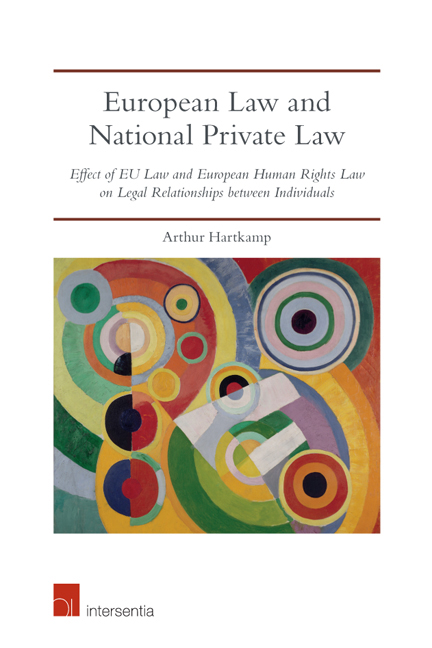 European Law and National Private Law
European Law and National Private Law Book contents
- Frontmatter
- Preface
- Contents
- Table of Cases
- Table of Legislation
- List of Abbreviations
- Part I Sources of European Law and Their Influence on National Private Law
- Chapter 1 Introductory Observations
- Chapter 2 The Tfeu and Private Law
- Chapter 3 General Principles of EU Law and Private Law
- Chapter 4 Directives and Private Law
- Chapter 5 Regulations and Private Law
- Chapter 6 Fundamental Rights and Private Law
- Part II Overview of Directives and Scholarly Projects in General Private Law
- Bibliography
- Index
Chapter 2 - The Tfeu and Private Law
from Part I - Sources of European Law and Their Influence on National Private Law
Published online by Cambridge University Press: 22 September 2018
- Frontmatter
- Preface
- Contents
- Table of Cases
- Table of Legislation
- List of Abbreviations
- Part I Sources of European Law and Their Influence on National Private Law
- Chapter 1 Introductory Observations
- Chapter 2 The Tfeu and Private Law
- Chapter 3 General Principles of EU Law and Private Law
- Chapter 4 Directives and Private Law
- Chapter 5 Regulations and Private Law
- Chapter 6 Fundamental Rights and Private Law
- Part II Overview of Directives and Scholarly Projects in General Private Law
- Bibliography
- Index
Summary
INFLUENCE OF EU LAW ON NATIONAL PRIVATE LAW: INTRODUCTORY OBSERVATIONS
We have seen in Chapter 1 that EU law produces direct effect in the domestic legal systems of the member states and that it has precedence in these legal systems over conflicting domestic legislation. Insofar as the provisions of EU law are suitable for having direct effect, individuals can invoke them before their national courts and thus assert their right to the application of those provisions in cases in which national provisions laid down by law, regulation or administrative action conflict with EU law. A provision is suitable for having direct effect when it is unconditional and sufficiently precise, which means that it must be clearly worded and not conditional upon an implementing measure to be enacted by an institution of the EU or a member state with respect to which there is a margin of discretion. The fact that a provision is laid down in the form of a treaty obligation imposed on the member states does not in itself preclude direct effect.
Direct effect can be ‘vertical’ or ‘horizontal’. Direct horizontal effect of treaty provisions was the subject of an introductory explanation in no. 12 ff. above and will be discussed in greater detail in section 3 of this chapter (no. 42 ff.).
REVIEW OF LEGALITY OF NATIONAL PRIVATE LAW MEASURES
Before dealing with direct horizontal effect, I will first, in section 2 (no. 31 ff.), discuss to what extent individuals can rely on the TFEU provisions on the freedoms to argue that national private law legislation is contrary to those provisions. Usually, EU provisions are invoked in disputes between an individual and the state, but it may also happen in disputes between two individuals. Member states must act in accordance with EU law, which implies among other things that they cannot issue and maintain legislation in contravention of EU law. If there is a dispute over whether a domestic legislative act conflicts with a provision of EU law that has direct effect in the sense discussed in no. 9, individuals may submit the dispute to the courts for a decision.
- Type
- Chapter
- Information
- European Law and National Private LawEffect of EU Law and European Human Rights Law on Legal Relationships between Individuals, pp. 29 - 94Publisher: IntersentiaPrint publication year: 2016


